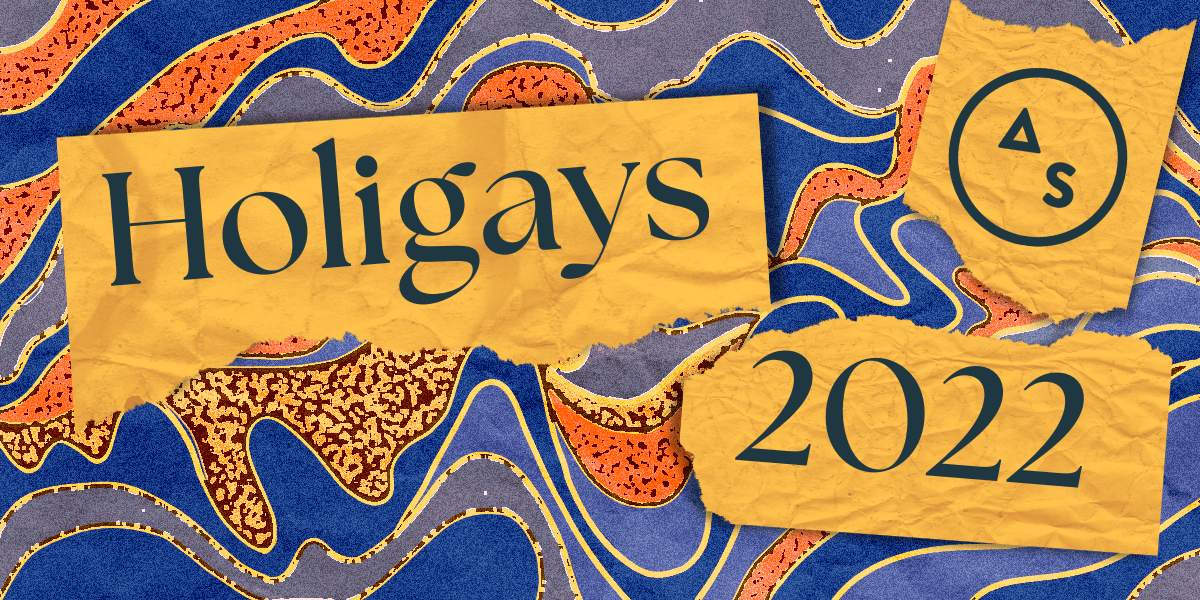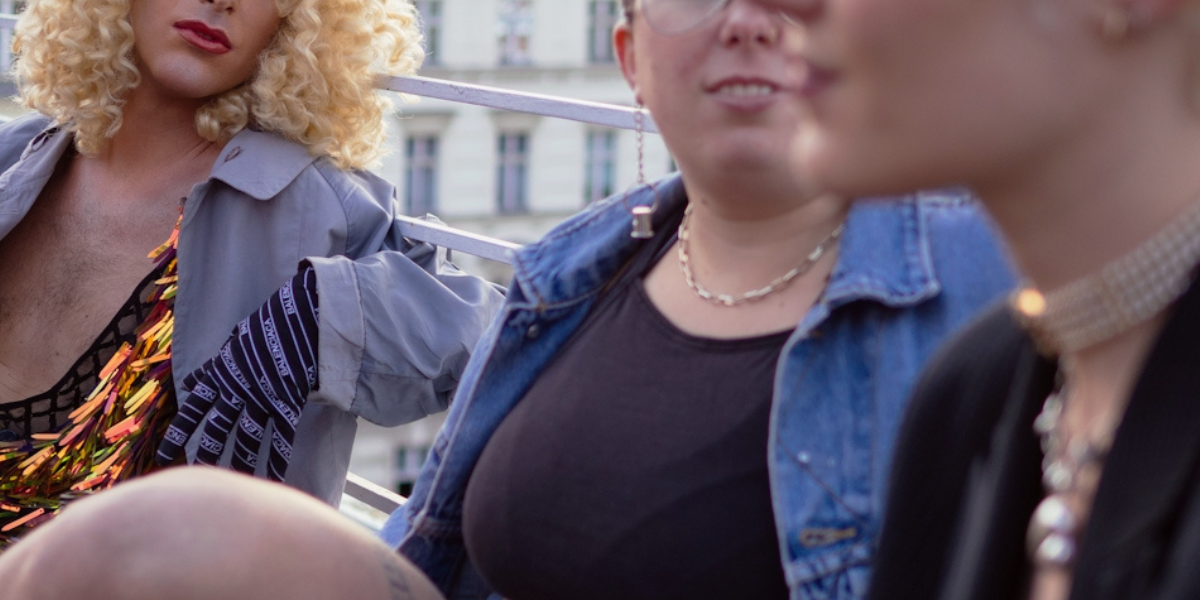
Expanding traditions to be inclusive is something that LGBTQ Jews have been doing for one another for a very long time, becoming a tradition in of itself. From creating trans rituals and blessings to hosting and partaking in queer mikvehs, there is a beautiful community of love and validation. That being said, the Jewish community still has a long way to go when it comes to making our traditions accessible to those who are disabled. There is a group that focuses on disabled grief within the Jewish community, and now that we’re getting close to three years into the pandemic, we’re seeing in these meetings that the grief is only intensifying. This is especially true around the holidays, as they are very community-oriented and tend to involve in-person, indoor gatherings.
While it’s heartwarming as a queer, disabled Jew to find spaces carved out for us, the amount is still very limited. When I look at different synagogues to see what kind of inclusive programming they have, a lot come up short across the sects. In spite of increased risks associated with Long Covid and what those risks mean not just for the general population, but for the immunocompromised, most places have dropped masking mandates. These decisions are noted on synagogue websites to be in accordance with CDC guidelines, which no longer makes masking mandatory. Some synagogues have mask-optional policies that include proof of vaccination. These precautions are important, but they still leave out a lot of people.
Isolation within the disabled Jewish community is very high; I’ve attended multiple Zoom meetings with fellow disabled Jews where we express this deep grief and loneliness. It begs the question, what are synagogues doing to make sure that they’re a welcoming space for all their congregants? Who is missing at the community table due to inaccessibility? Accessibility shouldn’t be a privilege, it should be the standard. I’d like all Jews who come across this to think about the small ways they could be advocates for the disabled within their midst this holiday.
There are multiple ways to be inclusive of the disabled community this Hanukkah. Talk with your Rabbis about forming an accessibility committee that has discussions with disabled members, advocates, or organizations, to see how accessibility can be improved. See if your shul’s chesed (care) committee does outreach to disabled members through different means. Whether it’s meet-ups outside and masked after testing for Covid, calls to check-in and share updates, sending care packages for the holidays, there are plenty of things that can be done. Ask for all events to be hybrid going forward. Conversations like these should be on-going and shouldn’t be expected to be resolved quickly. Care and consistency are key.
For disabled Jews, finding solace in our faith and culture is still something we do, even if we feel abandoned by the overall Jewish community. Throughout the year, I’ve seen a handful of events hosted over the holidays that were not only accessible to those who are disabled, but incredibly fun as well. The Jewish Zine Archive held a collaborative zine making event over Zoom for Purim that included music, writing, and drawing. I’ve seen shuls teach about how to make local lulavs for Sukkot. Several organizations had online seders as part of their Passover offerings. Hanukkah is no different when it comes to communities crafting something unique and inclusive.
One thing I’m personally trying out this year is the creation of a group-crafted menorah. I’m putting a large paper menorah on my wall prior to Hanukkah beginning. During this time friends, loved ones, acquaintances, and people within the disabled Jewish community are welcome to submit something joyous that happened to them this past year, or something that brought them hope and comfort. These submissions will be added to post-it notes that will be put around the menorah, acting as the light emanating from the candles. On each night of Hanukkah, a handful of the messages will be shared on Instagram until we go through them all, providing some much needed collective light after the dark year we all experienced.
The paper menorah is but one example of ways that disabled Jews come together during the holidays in alternative ways to the traditional services and dinners. Everything from lighting candles on the phone with friends, playing dreidel on Zoom, sending handmade cards, and partaking in crafts are all wonderful things that can be done throughout Hanukkah. Creating new rituals and ways of expressing and celebrating Judaism is nothing new within our tradition — all that’s needed is some creativity and care. If you’re a disabled Jew who feels particularly lonely this holiday season, you should know that creating your own rituals does not make you less Jewish. Changing how you approach holidays to make Judaism more accessible for you is a mitzvah, as it keeps you connected and present. No one can tell you how to make Hanukkah your own within your limitations. Some people can’t afford menorahs, or can’t find one when thrifting. Not everyone can eat fried foods for health reasons. Some people are immunocompromised and can’t celebrate with family and friends in person if proper precautions aren’t being taken. However we choose to celebrate is Jewish, full stop.
This Hanukkah, I hope more ableds take stock of the accessibility within their shul and practices. I hope Rabbis and synagogue staff expand their types of outreach and care for disabled members. I hope there will be more hybrid offerings for those who can’t be in-person. My wish is for all disabled Jews to have a wonderful holiday where they feel loved, included, and appreciated. As we continue to build alternative rituals we carve out a path for others to travel along with us, creating the light to keep us going.








Comments
chag sameach, riley! (crip sameach? is that anything?) thank you for this lovely article- i definitely have Notes for my temple on accessibility. one big thing is that even when the rabbi remembers to enable closed captioning on our zoom services, it only transcribes the english, not the hebrew. do you know of any plug-ins that can handle liturgical hebrew?
Speaking as a shul worker, I would also encourage anyone who feels their synagogue isn’t accomodating to ask what the barrier is for not providing what you need – the answer will likely be money or staffing making it impossible.
While we can and should all strive to be better, I think there’s often an assumption that synagogues have resources that they often just don’t actually have. Without money and staff to implement the changes suggested by a committee, nothing will change. Asking what is needed to make change is just as important as describing what you would like to change.
I think this is true and very worth considering, but I also know that we as disabled folks come up against this barrier time and time again, that there isn’t space in the budget or resources to support us. I think it is worth asking not to be an afterthought, and for effort to be made to include us perhaps even at the expense of other budgetary uses because we should not be an expendable, easily ignored part of our own communities. So much of what would be supportive to disabled folks in any community is to be actively included, from the budgeting and planning stages onward, to make sure that our needs are met, and that starts with acknowledgement of our existence and importance, and willingness to meet us where we are.
Absolutely – depending on what kind of shul it is, though, staff do not decide the budget and have no power over it (Reform, Conservative). Opening a dialogue with staff, who absolutely will know who the major players are in deciding the budgets and who will be able to get things done, will be 1000% more effective than forming a committee (committees, while useful for some things, are time-sinks for the staff a lot of the time). Shul workers, if offered ammunition in the form of actual congregants who raise a concern with them directly, can get a lot done by simply bringing it up to the right people and directing them your way.
I agree with Sarah Alexander; I think these conversations with our shuls should be ongoing with expected hurdles. That said, accessibility should be considered a priority when budgeting as it directly deals with congregants and their ability to interact with their shul. Disabled communities have been working together for a long time with minimal funding to find ways of creating access. I fully believe shuls can do this too. It’ll just take lots of conversations, committees, collaboration with other organizations, and budgeting/fundraising.
I haven’t checked if Google does it with Hebrew yet; but youtube(& google translate), when it came to watching a video in Spanish & another in Arabic, did a pretty good job translating it English when closed captioning is on. Could see if there is a plug in that taps into google translate that could do that or via youtube live stream.
Chag Crip Sameach to you too! The question on transcribing Hebrew is an excellent question and I’ll definitely look around and see what I can find. Thank you for that!
awwwwwww about the paper menorah!!!!
tyyyyyyyy
Thank you for this. That is a good idea of the joyous, hopeful, &/or comforting submissions tied to each night of Chanukkah.